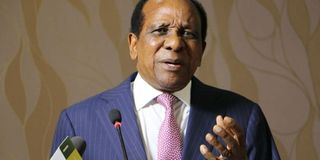Help private sector to perform well, govt told

What you need to know:
This was said at the 11th meeting of the Tanzania National Business Council (TNBC) held at the State House in the nation’s commercial capital Dar es Salaam.
Dar es Salaam. Private sector operators say that, despite the fact that the Tanzanian economy is encouragingly growing at the relatively healthy rate of 6.8 per cent per year, the government still has a long way to go to ensure that the growth is not only sustainable, but is actually sustained on the ground.
This was said at the 11th meeting of the Tanzania National Business Council (TNBC) held at the State House in the nation’s commercial capital Dar es Salaam.
“We are doing well – but not that well, compared to our counterparts Ethiopia and Ivory Coast,” said Tanzania Private Sector Foundation (TPSF) chairman, Reginald Mengi.
The economic growth rates of Ethiopia and Ivory Coast’s stand at 8.2 per cent and 7.6 per cent respectively, according to Mr Mengi.
“I believe that, if well supported, the private sector is one of the main drivers which would keep the cycle of economy moving,” noted Mr Mengi
Members of the private sector at the meeting identified six aspects they wish the government to work on. These include the inordinately high corporate tax, lack of capital and delays in debt payments to local suppliers of goods and services. Others are delays in refunds of 15 per cent additional import duty on industrial sugar, and the tax burden in general, which is the result of an unfair taxation system.
In the event, Mr Mengi called for the reduction of corporate tax from the current 30 per cent to 10 per cent.
“In so doing, it would leverage on the mushrooming of businesses – and, eventually, money circulation,” Mr Mengi argued.
The Coca Cola Company managing director, Basil Gadzios, urged the government of Tanzania to pay the debts it owes to local suppliers of goods and services as a matter of course.
Noting that over Sh35 billion in tax refunds have not been paid to food, beverages and pharmaceutical industries as existing regulations require.
“Our biggest problem is the duty on industrial sugar. We humbly request for the ‘omission’ of 15 per cent refundable duty,” he pointed out.
In earlier days, importers of industrial sugar were being charged 10 per cent duty. But the government steeply hiked that to 25 per cent in the FY-2015/16 budget estimates.
For his part, the chairman of the Confederation of Tanzania Industries (CTI), Dr Samuel Nyantahe, said the additional 15 per cent duty on imported industrial sugar was an administrative burden to industries.
“This increases costs of production, and makes our products less competitive in the global market,” Dr Nyantahe lamented.
So far, the chairman said, more than Sh3.5 billion has been cumulatively paid as bank interest.
To address the capital woes challenge, Dr Nyantahe called on the President John Magufuli government to capitalize the TIB Development Bank so that it can finance domestic manufacturing.
The TPSF executive director, Godfrey Simbeye, lamented the country’s highly unfavorable revenue collection system, and urged replacement of the presumptive tax system should with a self-assessment system.
For his part, the chairman of the Tanzania Association of Tour Operators (Tato), Mr Wilbad Chambulo, said Tanzania’s multiplicity of taxes seriously undermines the country’s high-potential tourism sector – sourly noting that Tourism is the victim of at least 39 different taxes.
Assuring traders and investors alike, Prime Minister Majaliwa Kassim Majaliwa said the government would keep on supporting the private sector through the right policies and regulatory frameworks – and also establish a business-friendly environment.
“I am going to meet with my ministers to discuss the issues of concern” as raised, the premier pledged.




